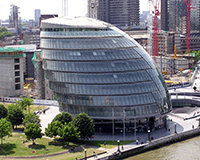 The London mayoral election may be a year away but the race is already well under way. Candidates are oiling up their press machines and dropping policies left, right and centre. But what does the property industry want to see from the next mayor and whom will it support?
The London mayoral election may be a year away but the race is already well under way. Candidates are oiling up their press machines and dropping policies left, right and centre. But what does the property industry want to see from the next mayor and whom will it support?
Sadiq Khan, Diane Abbott, Tessa Jowell and David Lammy are all in contention for the position of Labour’s mayoral candidate. Jowell is the frontrunner and has been vocal about her housing policies, winning some support from the British Property Federation.
“What we have seen from Tessa has largely been sensible – supply-side solutions and a focus on releasing public sector land, which is important for encouraging the development of new homes,” says BPF chief executive Melanie Leech. “A Homes for Londoners-type body, which has been proposed, however, is only as good as the powers and funding that go with it.”
Lammy has also proposed a Homes for London agency, with which he hopes to raise £10bn on the bond market. He has also pledged to redefine affordable housing. Both these proposals win him favour with Derek Gorman, managing director of market rented assets at Grainger. He says: “The next mayor must continue to focus on stimulating new housing supply, supporting the new emerging build-to-rent sector and addressing the problem of shrinking affordability.”
Candidate Khan wants to make the rental sector more accessible and fair. He wants to introduce a London “living rent” option for affordable housing, freeze rents and crack down on bad landlords.
His focus on the less well-off sections of society has won him the support of former mayor Ken Livingstone, who for this reason believes Khan will be more driven to provide affordable homes for Londoners. At the BPF annual conference last week, Livingstone said: “He is not one of these nerdy kids who has studied philosophy and politics. He is like me in that he is a person who has made his own way up and wants to get things done.”
Abbott is perhaps the candidate most likely to benefit from operating at a distance from her party, as Livingstone and Boris Johnson did during their campaigns for mayor. She was sacked by former leader Ed Miliband and has often voted against her party. She has also been very vocal in calling for more powers for London.
Both of these facts could be a boon for Abbott. As Leech says: “The new mayor will have to be able to work with any political party – as continuity is imperative to long-term projects, as is support from national government. The mayor must fight London’s corner, but in a way that brings other parts of government with them.”
A former rival of Livingstone, Steve Norris, is toeing the Conservative party line and supporting Zac Goldsmith’s proposed bid. Although Goldsmith owns a lot of property, so far his policies relating to the sector are thin on the ground. Perhaps that is why Norris has caveated his support by saying: “I don’t care who wins, as long as they think about the things that matter, which are housing and infrastructure.”
This view is shared by Alistair Elliott, senior partner at Knight Frank. “Whoever we have must make sure there is a more disciplined agenda for social and affordable housing provision, speed up the planning system and ensure London can deal with expansion by improving our infrastructure,” says Elliott.
Many more people are expected to announce their run for mayoralty between now and 5 May 2016, with former England footballer Sol Campbell having put his name forward at the start of this week. Undoubtedly there will be mistakes, shock decisions and changes to the line-up. But the demands of the industry are unlikely to change – it wants a mayor who can tackle the housing crisis and keep London’s position as one of the world’s top cities secure.










